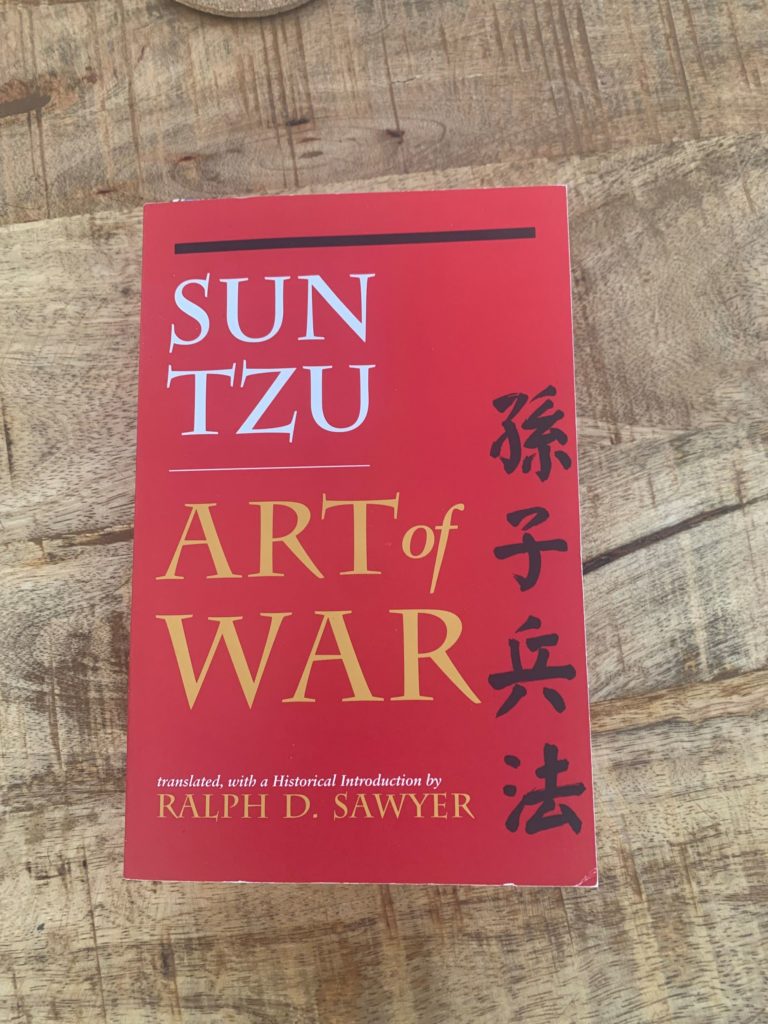If you are reading along with me, by now you probably see why this book is held in high regard. There is so much wisdom packed in each chapter that we probably have heard but didn’t know the source. I am finding that myself.

While this chapter is titled Waging War, I found it to be more about logistics and overall objective rather than super secret tactics. Our politicians may be clever, but they are definitely not students of Sun Tsu. As a result, most recent conflicts have ground into failure (by my judgement).
Sun Tsu says that what motivates people to fight is anger, but what keeps them going is the spoils of war. We probably have heard ‘Gung Ho’ stories. In the days post 9/11 there were lots of them. Does Rusty Tillman ring a bell? Tillman was a young NFL safety that felt the call to his country immediately after 9/11. He gave up the money, the glamor as well as likely his childhood dream to be killed by friendly fire in Afghanistan.
My own grandfather told me that he volunteered for the Army in 1941 because he wanted to kill Germans. Granted most Americans were more mad at the Japanese, I suspect that his first generation French motivation had to be with the takeover of his family homeland. Anger is what drove enlistment.
Spoils are more complicated today than standard practice during Sun Tsu’s era. Even as late as Korea, GIs were sent home with their service weapons. Not just that, but they also brought home anything that was collected during the tour of duty. This was not just firearms but swords, jewelry, flags, uniform pieces and pretty much anything that could be carried. While I don’t think those things were a motivation to keep fighting, it was certainly a nod to military, victory tradition.
There are all kinds of variables here but a soldier wasn’t a soldier wasn’t a soldier. The lowest group were conscripts or militia members. They were called into service on an as needed basis. The leaders tended to be the rich folk of society. They certainly took advantage of war to enrich themselves. If there was a regular army, they tended to be a hodgepodge of things like criminals and misfits. In that case, being a soldier sure beat the alternatives.
The key of this chapter is not what motivates but if you will win. “No army will win a prolonged conflict.” This is the principle that proves our politicians have not read The Art of War. Vietnam, Afghanistan and Iraq sum up the last sixty years of US military action. These are all conflicts greater than ten years in duration and all losses in my opinion.
If you remember the mid-2000s, the question was asked, and asked and asked ‘What is the exit strategy’? Silence. We got into this war because of anger and we killed a lot of ’em. But good news for the Taliban, we left a lot of good weapons and equipment for them. So much so, they have donated some to Hamas to use in Gaza.
I go back to the self-realization in my podcast earlier this week. We act like we are surprised that militant Islam hates us. After we have spent the last sixty years meddling somewhere that we don’t belong or understand, we created generational hatred. We duped them into the petro dollar and keep getting involved in something that is not our concern every chance it warrants. We are the problem here, period. I digress from the Art of War.
If we evaluate the other side in what we call conflicts, it is pretty easy to see the perspective difference. It wasn’t a war to the Vietnamese (or take your pick), it was life. The fighting will end when I am dead or they are gone. Until such a time, this is how I live. There is no option to withdraw or leave. Long wars require long supply chains and tricks for morale since there is no opportunity to enrich the soldiers. Anger toward the enemy fades fast when you cant leave your post. It soon becomes anger at the controller rather than the ‘enemy’.
End Your Programming Routine: I love the idea of my country but I hate what it has become. Freedom takes maturity and that is in short supply when you can take at every opportunity. This is the reason we don’t have short wars. It doesn’t benefit the oligarchical pocketbook. That would be the ones that own the politicians and by proxy the politics.
Recent Comments